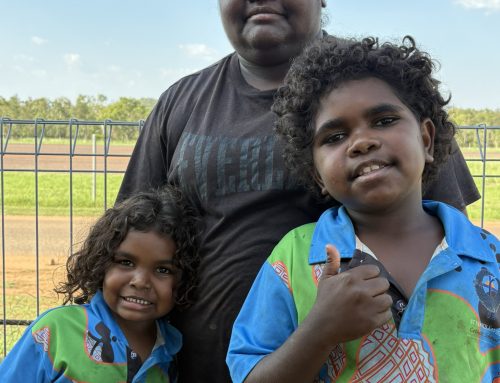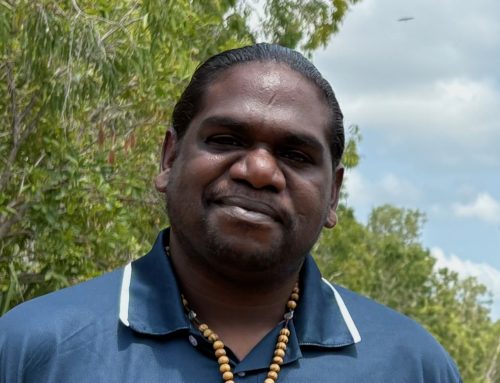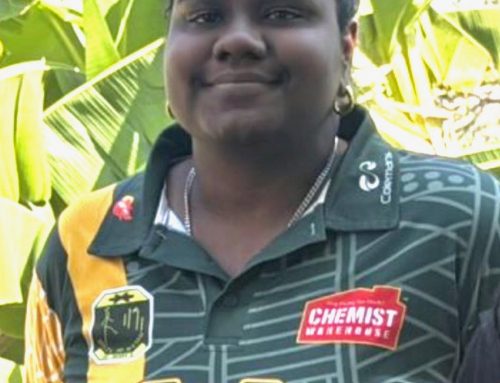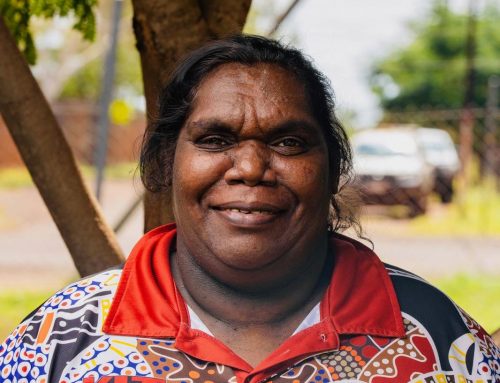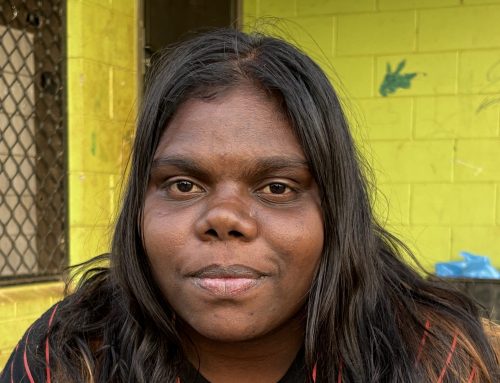Galiwin’ku, NT
Senior Honorary Research Fellow, Charles Darwin University
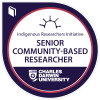
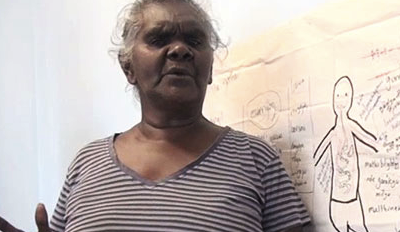
My name is Rosemary Gundjarraŋbuy.
I am an elderly woman from Galiwin’ku who is a respected person in the Garrawurra clan, as well as in the community.
I worked for 25 years as a teacher at Shepherdson college when it was a bilingual school. We had a two-ways approach to education taught in the school. I trained for this work by attending Batchelor College where I completed a Certificates 1, 2 and 3 as well as an Associate Diploma in teaching. I was going to complete my post-graduate degree, but I had to withdraw halfway due to illness.
After many years at the school, I resigned so that I could begin to work in the community. Initially, I was working for aged care with my daughter Anita Goluŋ. Working for the benefit of the elderly people was my first job in the community.
But this was a very stressful time in the community for petrol sniffing, so I applied for another job as a youth worker. I had to spend a lot of time talking and caring for the young people, inviting them to my home and teaching them that they had someone who cared for them and had love for them.
Sometimes me and my husband would take them away to my husband’s homeland where they could feel like they had parents looking after them. With our own money we provided them with food and looked after them. Those children that we took away to my husband’s homeland were the ringleaders who were teaching the others about sniffing. We taught them how to live well in the community, rather than spreading bad behaviour.
We would treat them the same as we taught our own children, and when they saw our children they wanted to change from doing bad things to travel on a good path. We gave them love and care, and they learnt a lot of things from us. We employed them as CDEP workers on the homeland so they could earn their own money, we supported them to be good role models in my husband’s community.
Instead of considering them to always be bad people, we helped them and supported them to change as they took on different kinds of work that they were good at. They became proud of the work they were doing.
 After that I worked for Miwatj Heath as a community worker at Galiwin’ku, at the same time that I was doing a Community Development course through the university. This is when the FAST program was first began in Galiwin’ku, and I became the first Coordinator of that program. This is where I learned how to be a Coordinator.
After that I worked for Miwatj Heath as a community worker at Galiwin’ku, at the same time that I was doing a Community Development course through the university. This is when the FAST program was first began in Galiwin’ku, and I became the first Coordinator of that program. This is where I learned how to be a Coordinator.
Later, through Menzies School of Health and Anne Lowell, a Health promotion program focusing on chronic health was introduced to Galiwin’ku. Both my previous work with the petrol sniffers and as a coordinator helped me to step into a coordinator role on the Sharing the Full and True Stories about Chronic Conditions project.
Through this work I came to apply for a coordinator’s position at Yalu’ Marŋgithinyaraw. I was working by side with the Yalu’ Marŋgithinyaraw manager, Joanne Garŋgulkpuy. Later, when the role of Yalu’ manager became free, the board decided to put me in there. I was in that role for nearly 10 years.
Charles Darwin University (CDU) Profile: Rosemary Gundjarranbuy
Research citations: 101+
Research Projects:
- Birthing on Country
- Indigenous Genomic Research: Repartiation Project (with John Curtin School of Medical Research, ANU)(2019)
- Remote Engagement and Coordination – Indigenous Engagement Research – Phase 2: Electoral Engagement and Education (with CDU and NTG)(2018-2019)
- Our Homes research project (with CDU and NTG)(2018-2019)
- Remote Engagement and Coordination – Indigenous Engagement Research (with CDU and NTG)(2016-2017)
- HEPPP Project (with CDU) (2015-2016)
- Community Development Program Research (2016)
- ‘Helping and Caring, not only our family: NT Indigenous Perspectives on Volunteering’ (with Australian Red Cross and CDU)
- Interplay project: Interplay between culture, community, empowerment, education, employment, health and wellbeing in remote Aboriginal and Torres Strait Islander communities (with Ninti One)
- Sharing the True and Full Story of Chronic Disease (with CDU)(2010)
- Footprints in Time (2008-10)
Reports
- Helping and Caring, not only our family: NT Indigenous perspecives on Volunteering (2018)
- RECIER Phase 2 – Galiwin’ku community report (2019)
- RECIER Phase 2 – Project Presentation by Rosemary Gundjarranbuy (2019)
- Our Homes Project (2020)
- Whole of Community Engagement (WCE) Initiative Final Evaluation Report (2017)
Selected Publications and Presentations
Lowell, A., Baker, R.D., Gundjarranbuy, R., Armstrong, E., Mitchell, A., Muthamuluwuy, B., McGrath, S.Y., Spencer, M., Taylor, S. and Maypilama, E.L., 2024. Learning from COVID-19 communication with speakers of First Nations languages in Northern Australia: Yolŋu have the expertise to achieve effective communication. First Nations Health and Wellbeing-The Lowitja Journal, 2, p.100033.
Ireland, S., Bukulatjpi, D.Y., Bukulatjpi, E.D., Gundjarraŋbuy, R., Adair, R., Roe, Y., Moore, S., Kildea, S. and Maypilama, E.Ḻ., 2024. Djäkamirr: Exploring principles used in piloting the training of First Nations doulas in a remote multilingual Northern Australian community setting. Women and Birth, 37(3), p.101573.
Hermes, A., Huebner, S., Easteal, S., Ormond-Parker, L., McCarthy, A., Garrawurra, R.G. and Wunungmurra, R.M., 2023. “We Are Taking It Back to Our Homeland; We Are Free to Move On”: Repatriation of Blood Samples to the Galiwin’ku Community. In Repatriation, Science and Identity (pp. 191-209). Routledge.
Maypilama, L., Buergelt, P., Garrawurra, G.R., Garawirrtja, B.J., Gondarra, G.J.D., Bukulatjpi, D.E., Bukulatjpi, Y.D. and Paton, D., 2023. Waka Ŋurrkanhayngu” Regenerating the existence of life”-Pathways for Reviving & Strengthening Indigenous Ways of Being-Knowing-Doing to Heal the Source of ‘Natural’& Social Disasters. In Healthy Environments and Lives (HEAL) 2023 Conference-Collective Action for Health, Environment and Climate.
Armstrong, E., Maypilama, Ḻ., Fasoli, L., Guyula, A., Yunupiŋu, M., Garrutju, J., Gundjarranbuy, R., Gapany, D., Godwin-Thompson, J. and Lowell, A., 2022. How do Yolŋu recognise and understand their children’s learning? Nhaltjan ŋuli ga Yolŋuy nhäma ga märr-dharaŋan djamarrkuḻiw marŋgithinyawuy?. Plos one, 17(8), p.e0272455.
Moore, T., Boton, E., Street, C., Gundjarranbuy, R. and Maypilama, E.L., 2022. The whole of community engagement initiative: Interculturality in remote Aboriginal education. Australian Journal of Indigenous Education (Online), 51(2), pp.1-17.
Buergelt, P., Maypilama, L.E., Bukulatjpi, Y.D., Gundjarranbuy, R., Bayon, J., Gondurra, J.G., Djotja, E., Paton, D., Sutton, S., McCarthy, A. and Smith, J.A., 2022. Waka Ŋurrkanhayngu-Regenerating the Existence of Life Working Together Two-way. In Healthy Environments and Lives (HEAL): Transformational Change for Environmental, Planetary, and Human Health.
Ali, T., Buergelt, P.T., Paton, D., Smith, J.A., Maypilama, E.L., Yuŋgirrŋa, D., Dhamarrandji, S. and Gundjarranbuy, R., 2021. Facilitating sustainable disaster risk reduction in Indigenous communities: Reviving Indigenous worldviews, knowledge and practices through two-way partnering. International journal of environmental research and public health, 18(3), p.855.
Buergelt, P., Maypilama, L.E., Bukulatjpi, D.Y., Gundjarranbuy, R., Dhamarrandji, S., Ali, T., Paton, D. and Smith, J.A., 2021. Genuinely working two-way with Indigenous communities utilizing both Indigenous and Western worldviews, knowledges and practices. In Developing Northern Australia.
Lowell, Anne, Elaine Läwurrpa Maypilama, and Rosemary Gundjarranbuy. “Finding a pathway and making it strong: Learning from Yolŋu about meaningful health education in a remote Indigenous Australian context.” Health Promotion Journal of Australia 32 (2021): 166-178.
Lowell, A., Maypilama, E. L., & Gundjarranbuy, R. (2020). Finding a pathway and making it strong: Learning from Yolŋu about meaningful health education in a remote Indigenous Australian context. Health Promotion Journal of Australia.
Spencer, M., Christie, M., Gundjarranbuy, R., Davis, V., & Dhamarrandji, S. (2020). Our Homes Research Project, Charles Darwin University, Uniprint.
Fasoli, L., Maypilama, E., Lowell, A., Guyula, M., Gundjarranbuy, R., Yunupingu, M., & Farmer, R. (2018). ” We’re still being dragged to be white”: Learning from Yolŋu growing up their children in two worlds. In Pedagogies for Diverse Contexts (pp. 78-94). Routledge.
Lowell, A., Maypilama, Ḻ., Fasoli, L., Guyula, Y., Guyula, A., Yunupiŋu, M., Godwin-Thompson, J., Gundjarranbuy, R., Armstrong, E., Garrutju, J. and McEldowney, R., 2018. The ‘invisible homeless’–challenges faced by families bringing up their children in a remote Australian Aboriginal community. BMC Public Health, 18, pp.1-14.
Boton, E., Gundjarranbuy, R. and Smith, J., 2017. Galiwin’ku Whole of Community Engagement Initiative Evaluation Report. Charles Darwin University.
Awards
- Appointed an Honorary Research Fellow at Charles Darwin University, 2016
- Appointed Senior Honorary Research Fellow at Charles Darwin Univiersity, 2020
- Tarrn Doon Nonin Aboriginal and Torres Strait Islander Health Research Ethics Project Award – Lowell, A., Maypilama, E., Gundjarranbuy, R., Fasoli, L., Yunupiŋu, M., Godwin-Thompson, J., Guyula, A., Garrutju, J., Guyula, Y. & Armstrong, E., 2019
Media Stories
- Caring for Yolŋu and ways of life during COVID 19 (Indigenous X, June 2020)
- Almost nine out of 10 adults in remote NT Indigenous communities lack basic literacy skills, report finds (ABC, 2017)
- Family History Month (AIATSIS, 2024)
- COVID vaccine Q&A in Yolŋu (Menzies, 2020)
Presentations:
“From Cyclones to COVID-19: Disaster Management from a Yolŋu perspective”
Interplay Project, Ninti One (2007)
Rosemary Gundjarranbuy from Yalu Foundation explains the importance of teaching kids about Aboriginal culture so they can become future leaders.


